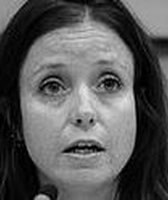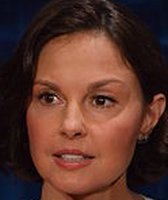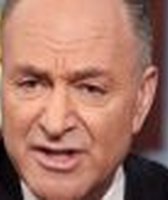Stand up for the facts!
Our only agenda is to publish the truth so you can be an informed participant in democracy.
We need your help.
I would like to contribute
After Russian President Vladimir Putin called Donald Trump "very talented," the GOP frontrunner has defended Putin against suspicions that Putin kills journalists who don’t agree him.
It started on MSNBC’s Morning Joe last month when host Joe Scarborough asked about it.
Trump responded, "He’s running his country, and at least he’s a leader, unlike what we have on this country. I think our country does plenty of killing also, Joe, so you know."
"I’m confused," Scarborough pressed. "You obviously condemn Vladimir Putin killing journalists and political opponents, right?"
"Oh sure, absolutely," Trump conceded.
Sign up for PolitiFact texts
A few days later, Trump defended Putin again, to ABC’s George Stephanopoulos. "You're supposed to be innocent until proven guilty, at least in our country. It has not been proven that he's killed reporters."
We were curious what the evidence showed about Putin and his interactions with reporters. (Trump, for his part, says he hates reporters but would never kill them.)
Overall, Trump is right that no one has proven Putin to have ordered assassinations of dissidents. However, experts say the political climate in Russia is responsible for the high volume of journalist murders in the country.
The fourth estate in Russia
Russia currently ranks 180 out of 199 countries for press freedom, behind Iraq, Sudan, and the Democratic Republic of Congo, according to the international watchdog Freedom House.
Though it has never been known for its media independence, Russia’s press freedom and ranking have continuously decreased in the past decade under Putin. Here’s a breakdown we made using data from Freedom House for the years 2002 to 2015:
Putin has been in power since 2000, when he was first elected president and when his regime began to commandeer the press. Sometimes this could mean a literal takeover. In 2000, authorities raided the offices of the major television network NTV and arrested its owner Vladmir Gusinsky for fraud. The charges were dropped once Gusinsky agreed to sell his media empire to a state-controlled company.
More often, the Kremlin makes it difficult for independent outlets to operate in roundabout ways: denying broadcast licenses, coordinating providers to dump channels, banning advertising on cable, limiting foreign ownership of media and firing journalists for "extremism."
But what about murdering them?
Reporters killed
Combining data from two nonprofits that records violations of press rights (the New York-based Committee to Protect Journalists and the Moscow-based Glasnost Defense Foundation), we found that at least 34 journalists have been murdered in Russia since 2000.
(This tally only includes deaths confirmed or likely to be work-related homicides committed in Russia. It doesn’t include murders where the motives are unclear, or journalists killed in war and on other dangerous assignments, like covering the mob or riots.)
For comparison, in the same time period, two journalists were murdered in China, while three were killed in the United States (including the on-air deaths of two television reporters in Virginia this year).
Nina Ognianova, the coordinator for the Committee to Protect Journalists’ Europe and Central Asia program, said journalists covering corruption, human rights abuses, organized crime, and official wrongdoing can be "slain with impunity in Putin’s Russia."
"Their killers are emboldened to act by an administration that marginalizes them, isolates them, and downplays their role in society," she said.
Of the 34 killings in Russia, many of the suspected perpetrators are military officials, government officials or political groups. The vast majority of cases remain unsolved. Here’s a breakdown:
Just one case over the past 15 years was fully adjudicated. In 2011, two ultranationalists were convicted of the 2009 double murder of a prominent human rights lawyer and Anastasia Baburova, a freelancer for the opposition newspaper Novaya Gazeta. Baburova had covered the rise of neo-Nazism and race-motivated crimes in Moscow.
The murders of two other Novaya Gazeta reporters resulted in partial justice. In 2000, Igor Domnikov died from an attack in his apartment after reporting on government corruption. Though Domnikov’s assailants, members of a criminal gang, are serving prison terms, the statute of limitations ran out before the former deputy governor suspected of ordering the attack could be convicted.
The third journalist assassination, of a journalist renowned for her critical coverage of Putin and the human rights abuses inflicted during the war in Chechnya, made waves around the the world. On Oct. 7, 2006, Anna Politkovskaya was shot in her apartment after receiving, and narrowingly escaping, numerous death threats. The five men hired to kill her were convicted and sentenced seven years later, but the identity of the person who ordered the murder (believed to be $150,000 contract) remains unknown.
Putin’s role
Putin has denied involvement in Politkovskaya’s death, condemning it as a "hideous crime" and arguing that her murder was more damaging to the Kremlin than her reporting.
As for the other assassinations of journalists during his reign, experts say Putin isn’t directly responsible for any of them.
The editors and reporters of Novaya Gazeta do not believe Putin ordered the murders of their colleagues, according to Katrina vanden Heuvel, editor of the liberal magazine The Nation who spent several decades reporting from Moscow. However, she said on Dec. 21’s Morning Joe, they do believe that he "created the climate" in which the murders are possible.
The assassinations of Kremlin critics may even be desirable and don’t need to be signed off by Putin personally, suggested Harley Balzer, a government and international affairs professor at Georgetown University who specializes in Russian and East European studies.
"We know from Karen Dawisha's book (Putin’s Kleptocracy) that as deputy mayor in St. Petersburg, he never asked for a bribe. He did not need to do this," Balzer said. "He controlled a mayor's contingency fund that received 25 percent of the funds in every contract the city signed — no fingerprints."
Similarly, in cases where dissident media outlets are stifled, Putin isn’t necessarily or even probably the person who issues the command.
Ognianova of the Committee to Protect Journalists acknowledged that there’s no evidence linking Putin to the murders, but said he’s "surely lowered the cost."
The journalists
Finally, we wanted to provide more details about individual journalists murdered in Russia since 2000. Deaths marked with an asterisk (*) are not a part of our tally of 34 deaths because they are not classified as homicides by authorities or watchdog groups, but have aroused suspicions:
• March 9, 2000: Prominent investigative journalist Artyom Borovik* died in a mysterious plane crash. According to the official investigation, de-icing fluid was not applied, the plane departed without permission and take-off devices were improperly used. Many suspect these were not accidents, given Borovik’s criticism of Putin. Borovik became famous in the west for his reporting on war in Afghanistan, was a correspondent for 60 Minutes, and launched several investigative publications and TV programs that consistently criticized Putin’s regime.
• July 16, 2000: Igor Domnikov, an editor and reporter for the independent Novaya Gazeta who covered local government corruption, died after being attacked. His assailants are serving prison terms but the ex-government official who orchestrated the attack was not convicted.
• July 26, 2000: Sergey Novikov, the owner of the independent radio station Vesna, was shot in his apartment. Novikov was a vocal critic of local government corruption and received death threats prior to his murder. The case remains unsolved.
• Sept. 21, 2000: Radio Liberty correspondent Iskandar Khatloni died from an attack by an unknown assailant. Khatloni, who was also a poet and former BBC correspondent, was covering human rights abuses in Chechnya. The case remains unsolved.
• Oct. 3, 2000: Sergey Ivanov, the director of the independent and influential TV station Lada, was shot in his apartment. The case remains unsolved.
• Nov. 21, 2000: Cameraman Adam Tepsurgayev, who shot most of Reuters’ footage from the second Chechen conflict, was shot dead in a Chechen village. The Russian government contends that Chechen guerrillas murdered Tepsurgayev, but local residents were doubtful. The case remains unsolved.
• Feb. 3, 2001: Photographer Valery Kondakov was killed after the publication of photos he took of the private mansions of urban elite in the city of Armavir. The case remains unsolved.
• Sept. 18, 2001: Eduard Markevich, the editor and publisher of a local newspaper, was shot in the back after receiving threats and surviving a previous attack. Markevich frequently wrote about local corruption and the suspected perpetrators of his murder are government officials. The case remains unsolved.
• March 9, 2002: Natalya Skryl, a local business reporter, died from an attack. She was planning to publish an article on the struggle for the control of a local metal plant. The case remains unsolved.
• April 29, 2002: Valery Ivanov, editor of the independent newspaper Tolyatinskoye Obozreniye, was shot eight times in the head. His newspaper is known for his coverage of local organized crime, drug trafficking and corruption. The case remains unsolved.
• April 18, 2003: Dmitry Shvets, the deputy director of the independent television station TV-21, known for his critical reporting on politicians, was shot dead outside the station’s offices. He had been investigating a mayoral candidate’s links to organized crime. The case remains unsolved.
• July 3, 2003: Novaya Gazeta deputy editor Yuri Shchekochikhin died from an acute allergic reaction while those close to him believe he was poisoned. Shchekochikhin was working on a corruption case involving high-ranking government officials and had received threats. The government has not opened an investigation and says there’s no evidence of foul play.
• July 3, 2003: Local television reporter Alikhan Guliyev was shot in his apartment building. Guliyev had accused an influential politician of campaign violations, and had survived an attempt on his life in 2002. The case remains unsolved.
• Oct. 9, 2003: A year after the murder of his predecessor Valery Ivanov, Tolyatinskoye Obozreniye editor Aleksei Sidorov was stabbed by two unknown assailants after receiving threats. Officials initially agreed he was murdered in retaliation for his investigative work, but the case remains unsolved.
• July 9, 2004: Forbes Russia founding editor Paul Klebnikov was shot in Moscow in a contract killing. The magazine had recently published a feature on Russia’s richest people, and Klebnikov himself had written books and articles about business, crime and corruption in Russia. A decade after his death, the case remains unsolved, prompting Secretary of State John Kerry to urge Russia to bring the perpetrators to justice.
• May 21, 2005: Cameraman Pavel Makeev, while reporting on illegal drag racing, was found dead on the side of a road. Though his death was initially classified as a traffic accident, Makeev’s colleagues say his death was related to his work. The case has been reopened but remains unsolved.
• June 28, 2005: Magomedzagid Varisov, who wrote critical political columns for the weekly Novoye Delo, was shot in his car by unknown assailants with machine guns in Dagestan. Varisov had received numerous threats through years. Three suspects were killed in October 2005, and the unsolved case was closed.
• Jan. 8, 2006: Reporter Vagif Kochetkov, who wrote for the the newspapers Trud and Tulskii Molodoi Kommunar, died from an attack. Officials labeled his death the result of a robbery, though only work-related documents and his cellphone were taken, while his wallet and fur coat were not. A local businessman was charged with the attack but later said he was coerced into confessing.
• Oct. 7, 2006: Renowned journalist and human rights activist Anna Politkovskaya was shot in her apartment after receiving, and narrowingly escaping, numerous death threats. The five men hired to kill her were convicted and sentenced seven years later, but whoever ordered the murder (believed to be $150,000 contract) remains unknown.
• Nov. 30, 2006: Prominent investigative journalist Maksim Maksimov was declared dead. He disappeared two years earlier while investigating local corruption in St. Petersburg as well as several unsolved murders. The case remains unsolved.
• March 2, 2007: Defense correspondent Ivan Safronov died from mysteriously falling from a fifth-floor window while investigating the sale of Russian arms to Syria and Iran. Safronov embarrassed military officials with reports on problems with Russia’s nuclear program. His death has been officially ruled a suicide, but his colleagues and friends say he had no reason to kill himself.
• Aug. 31, 2008: Magomed Yevloyev, owner of the independent news site Ingushetia, was shot while in police custody. Officials had been attempting to close down Ingushetia for extremism; the site had covered corruption, human rights abuses, unsolved murders, and voting fraud in the 2008 presidential election. Yevloyev was detained as a witness in investigation of a local explosion, and police say the shooting was an accident.
• Sept. 2, 2008: Television editor Telman (Abdulla) Alishayev was shot by unknown assailants in Dagestan. Alishayev produced an anti-radical Islam documentary two years earlier and received death threats from radical groups.
• Jan. 4, 2009: Advertising manager Vladislav Zakharchuk* died in a fire set in the offices of the opposition newspaper Arsenyevskiye Vesti, known for its criticism of local authorities. The cause of the fire is suspected to the arson.
• Jan. 19, 2009: Anastasia Baburova, a freelancer for the opposition newspaper Novaya Gazeta, was shot by ultranationalists in a double murder. Baburova had covered the rise of neo-Nazism and race-motivated crimes in Moscow. Her murderers, members of a neo-Nazi group, have been sentenced.
• March 30, 2009: Layout designer Sergei Protazanov died after an attack by unknown assailants. Protazanov was part of the editorial staff of Grazhdanskoe sogalsie, a newspaper known for its critical coverage of the ruling party of Russia. The case remains unsolved.
• July 15, 2009: The fifth Novaya Gazeta journalist murdered since 2000, Natalya Estemirova was kidnapped and shot execution-style in Chechnya. Her colleagues believe that Chechen officials ordered the Kremlin-backed assassination, as Estemirova had reported on human rights violations committed by authorities in the region. The official investigation pinned the murder a Chechen rebel who was killed by an air strike, but her colleagues and human rights activists believe this is a cover-up.
• Aug. 11, 2009: Abdulmalik Akhmedilov, an editor for the independent news website Hakikat and editor-in-chief of the political monthly Sogratl, was shot in his car in Dagestan. Akhmedilov was critical of government efforts to curb religious and political freedom and inaction in investigating assassinations. The case remains unsolved.
• Nov. 16, 2009: Broadcast journalist Olga Kotovskaya* fell to her death from a 14th floor window. Kotovskaya, co-founder of the independent TV station Kaskad, was currently fighting for control over the station with a former vice governor. Officials ruled her death a suicide, but watchdog groups are doubtful.
• Dec. 15, 2011: Independent newspaper founder Gadzhimurad Kamalov was shot outside his office in Dagestan. His newspaper Chernovik was known for its investigations in government corruption, police abuse and Islamic extremism, and his name appeared on an anonymous hit list.
• Feb. 7, 2012: Newspaper editor Victor Aphanasenko* died after sustaining a mysterious head injury in his house. Officials say he slipped, but colleagues believe it was no accident. Aphanasenko’s paper, Prestupnost I Korruptsiya, had been investigating ground raids in southern Russia.
• Dec. 5, 2012: News anchor Kazbek Gekkiyev, who covered social issues, was shot in the head while returning home from work. Several reporters at his state-controlled station, VGTRK, had received threats allegedly from Islamist separatist fighters.
• April 8, 2013: Mikhail Beketov, founding editor of the Khimiki, died after a 2008 attack by unknown assailants that left him severely brain-damaged, amputated and unable to speak. Beketov had covered government corruption and the planned destruction of the Khimki forest to make way for a planned toll road. In retaliation for his reporting, his car had been set on fire and his dog left dead on his doorstep. He never fully recovered from the attack and died five years later in the hospital.
• May 18, 2013: Nikolai Potapov, a former government official and founding editor of the local Selsovet newspaper, was shot in the Stavropol region. Selsovet was known for its coverage of government corruption.
• July 9, 2013: Akhmednabi Akhmednabiye, deputy editor of the independent newspaper Novoye Delo, was shot dead outside his house in Dagestan. He covered government corruption, abductions, police abuse and torture and had received numerous threats for his work. His name appeared on an anonymous hit list.
• Dec. 4, 2013: Arkady Lander, editor of the opposition newspaper Mestnaya, died after an 2010 attack by unknown assailants in Sochi. He underwent operations and hospitalizations for three years after his attack, which left him amputated and with a fractured skull. Lander had covered local elections and distributed his newspaper free of charge. The statute of limitations ran out on his case.
• Aug. 1, 2014: The body of independent journalist and civil activist Timur Kuashev was discovered in the woods after he disappeared a day earlier. Kuashev was threatened by police after reporting on civil liberty and human rights violations by security forces.
Our Sources
MSNBC, Morning Joe, Dec. 18, 2015
ABC, This Week, Dec. 20, 2015
MSNBC, Morning Joe, Dec. 21, 2015
Freedom House, Annual reports, 2002-2015
Committee to Protect Journalists, Journalists killed: Russia, 2000-2015
Committee to Protect Journalists, various journalist pages, 2000-2015
Glasnost Defense Foundation, Fatalities among journalists, 2000-2015
Email interview with Harley Balzer, professor of government affairs at Georgetown University, Dec. 22, 2015
Email interview with Nina Ognianova, coordinator for the Committee to Protect Journalists’ Europe and Central Asia program,
Email interview with Nataliya Vladimirovna Rostova, journalist and visiting scholar at UC Berkeley, Dec. 30, 2015








































